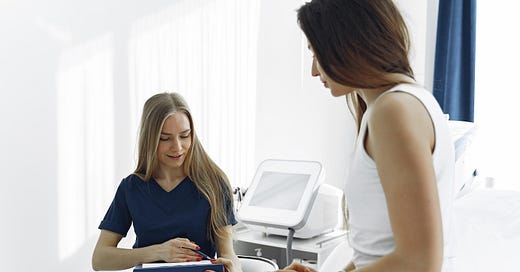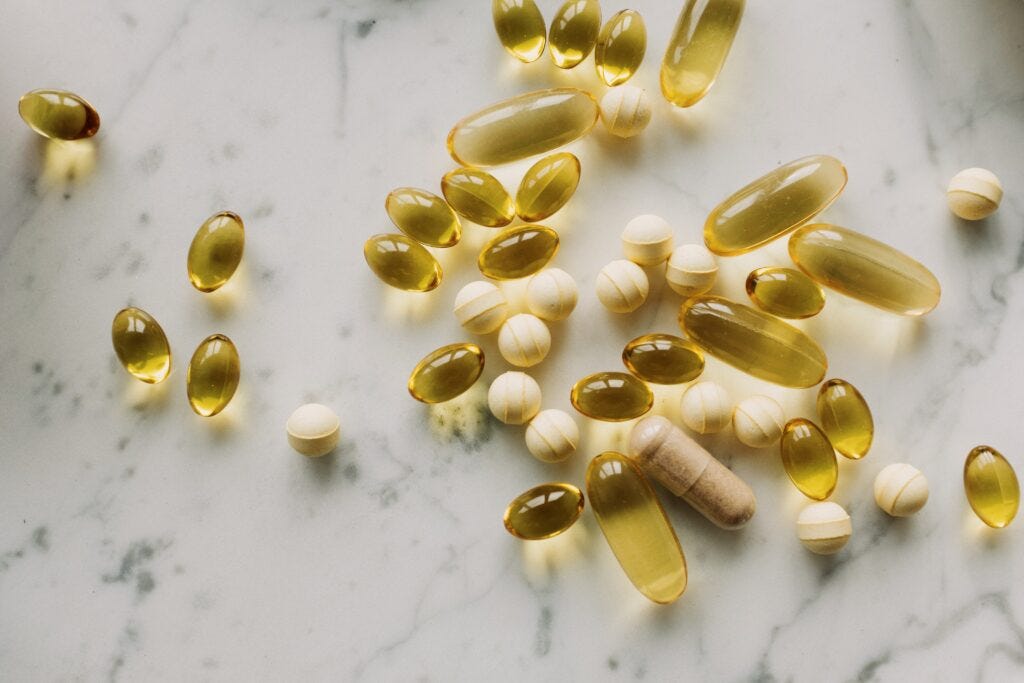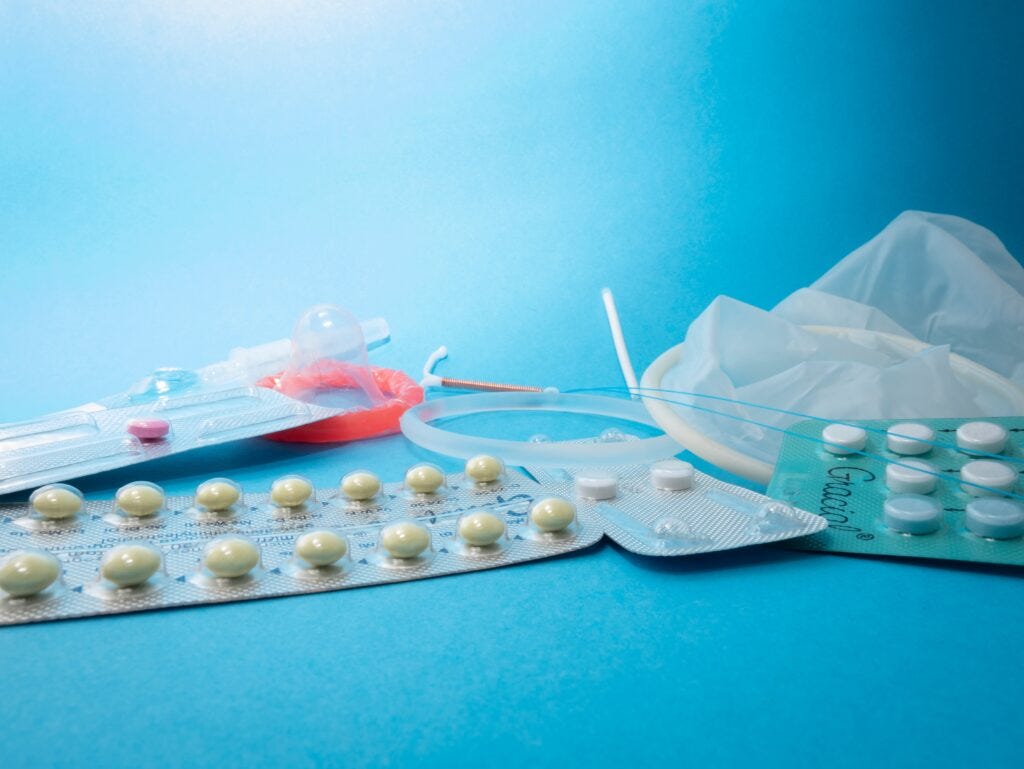The menopausal vagina: everything you need to know but were too afraid to ask
Sally Duffin explains vulval and vaginal anatomy, natural and medical interventions, and how to break the stigma and have the vaginal health conversation.
By Sally Duffin
Vaginal dryness and pain have to be the least talked about symptoms of perimenopause and menopause, yet they affect an estimated 50-60% of women. Many women struggle to talk about these symptoms due to the aura of shame and stigma that can shroud anything to do with vaginas. By the time menopause comes along, women can feel too embarrassed to seek help and suffer in silence.
We’re here to change that attitude. Let’s explore what happens to menopausal vulvas and vaginas (yes, there’s a difference!) and what steps you can take to get relief from painful discomfort.
Vagina or vulva – what’s the difference?
First, let’s check in on the language and terminology we use when we talk about our genitalia. It’s important to be accurate, especially when discussing symptoms with a healthcare practitioner, so that they know exactly what is happening for you.
Vulva
The vulva is the collective name for all the genital parts you can see outside of your body. It includes the clitoris, urethra (where we pee from), and outer and inner labia, or two sets of fleshy lips. Changes to the look and feel of the vulva are common during menopause. It’s a good idea to get to know what your vulva looks like and how it feels, so that you can monitor any changes.
Outer and inner labia
These sets of lips are there to protect the vagina from infection. There's no such thing as a standard vulva! Some women have inner labia that hang slightly lower than the outer labia, and this is perfectly normal. The inner labia contains tiny glands that help lubricate the vulval area for everyday comfort and sexual arousal.
Urethra
This is where we pee from. Thanks to the proximity of the urethra, vagina, and anus, urinary tract infections (UTIs) are much more common in women than men, and even more so during menopause. Harmful bacteria can easily translocate from the anus to the urethra and up into the bladder, or from the anus to the vagina, and cause infection.
Vagina
The inner labia act as the gateway to the vagina — the internal passage that leads up to the womb and cervix. When we talk about vaginal pain, soreness or infection, we are referring to this internal part of the body; everything outside of this part is the vulva.
What happens to your vulva and vagina during menopause?
During perimenopause and menopause, your vulva and vagina go through a lot of changes. Falling estrogen, progesterone, and testosterone affect the lubrication and sensitivity of the vulva (including the clitoris), and skin texture, thickness, and plumpness.
Estrogen helps regulate collagen — the protein that keeps our skin looking smooth and plump. We produce less and less collagen from our mid-twenties onward, and this rate of decline speeds up after menopause.
Collagen loss affects the plumpness and thickness of the lining of the vagina, and the skin that covers the vulval area. You may notice that your vagina, vulva, and perineum (the area between the vaginal opening and the anus) become thinner, feel itchy, and are prone to small tears and micro abrasions, especially during sex. If you have any scar tissue from vaginal surgery or childbirth this can shrink too, and become painful and uncomfortable.
The vagina itself loses elasticity and lubrication and gets shorter and narrower. Loss of muscle tone and shrinkage can lead to vaginal prolapse. Both your vagina and vulva may feel incredibly sensitive too—and not in a good way. This hypersensitivity can lead to sharp pains, dull aches, itching, and a burning sensation that makes even the loosest of soft underwear too uncomfortable to wear.
The vaginal microbiome
You might be familiar with the gut microbiome — the billions of microbes that live in the digestive tract. Well, there’s a vaginal microbiome, too. During menopause, falling estrogen levels alter the delicate pH balance inside the vagina. This affects the vaginal microbiome and allows some of the harmful species to take hold, leading to infections like thrush and bacterial vaginitis.
Painful sex and low libido
Vaginal pain and dryness have an understandable effect on sexual pleasure, particularly from penetrative sex. Using water or oil-based lubricants as part of foreplay can help, along with a daily vaginal moisturizing cream.
If dryness and pain are severe, seek help from a women’s health physical therapist (or women’s health physiotherapist, or WHP, as they’re known in the UK). As Jane Lewis, author of Me and My Menopausal Vagina explains, "Maybe you can't have sex…maybe you're in constant discomfort. Whatever it is, heading to your WHP is a great place to start."
A women’s health physical therapist can advise on exercise techniques and physical aids such as dilators that can retrain muscles in the vagina to reduce tightness and pain.
HRT for vaginal health
We commonly think of Hormone Replacement Therapy (or Menopause Hormone Therapy as it’s also known) as a prescription for hot flashes and mood swings, but it can support vulvovaginal health too. If you're not keen on taking HRT tablets, speak with your doctor about using localized estrogen therapy in the form of a vaginal cream or pessary — a flexible, supportive device placed in the vagina.
Localized estrogen acts only on the immediate tissues, and does not have a systemic effect like the pills or patches. Using it in your vagina and the vulval area can help improve skin texture and plumpness and support natural lubrication.
Natural remedies for vaginal dryness
If HRT isn’t for you—or HRT is helping but you still want to do more—try these natural remedies to support vulvovaginal health through menopause and beyond.
Collagen
As we’ve already mentioned, collagen loss has a profound effect on vaginal shrinkage and dryness. Supplement-wise, opt for a good quality Type I collagen — the most abundant type in skin tissues — from either bovine or marine sources. It’s not an overnight miracle though; collagen needs to be taken for at least 3 months to make a difference.
Plant-derived antioxidants
Plant-based antioxidant compounds are found in brightly colored fruits and vegetables, olive oil, herbs, and spices. Aim to include as many of these foods as you can each day to maximize your intake of these anti-inflammatory, protective compounds. Research shows that diets high in processed fats and sugars and low in antioxidant nutrients like vitamin C, vitamin E, and beta-carotene can alter the vaginal microbiome, increasing the risk of vaginal infections.
Omega 7
Sea buckthorn oil is rich in omega 7, a specific type of beneficial polyunsaturated fat. Omega-7 supports the health and lubrication of mucous membranes in the body and is effective for managing vaginal dryness. As with collagen, sea buckthorn supplements need to be taken for at least 3 months to make a difference.
Probiotics
Microbes in the vagina and gut are affected by menopausal hormone changes, so it makes sense to support them with probiotic foods, and in some cases, probiotic supplements. Fermented foods are key here — think sauerkraut, kimchi, kefir, and live yogurt. If you're new to fermented foods, start by enjoying a tablespoon 2-3 times a week, then increase this gradually until they are part of your daily routine.
Phytoestrogens
Phytoestrogens are plant-based compounds, similar in structure to human estrogen. They are many times weaker than our regular hormones, but can help modulate the negative effects of this drop in hormones.
Top sources of phytoestrogens include traditional soy foods like miso, tempeh, and tofu; ground flaxseeds, red clover, alfalfa sprouts, broccoli, and garbanzo beans. As well as increasing these foods, some studies highlight the benefit of using vaginal gels or creams made with soy isoflavones—a good alternative to try if HRT isn’t suitable.
Lifestyle factors that affect vaginal health
Alongside the hormonal changes that affect vaginal health during menopause, several lifestyle factors can make symptoms worse. It's worth doing a quick lifestyle audit to see if any of these are happening in your life right now.
Perfumed toilet paper: Chemical fragrances can worsen itching and irritation. Swap to unbleached, fragrance-free paper, or think about using reusable, washable cloth wipes instead. And remember to always wipe from front to back – never the other way. If your vulva is too sore for any kind of paper or fabric wipe, try keeping a small bottle of cold water in the bathroom to rinse after having a pee.
Tampons and sanitary towels: most products are made from plastic-based fibers and often contain fragrance too. Healthier options include organic, unbleached, fragrance-free cotton tampons or towels, reusable menstrual cups, washable cotton pads, or sea sponges.
Certain medications, like antihistamines and anti-depressant.s can cause vaginal dryness as a side effect. If this happens, speak to your healthcare provider about an alternative drug.
Skinny jeans and leggings: Unless they’re made from breathable fabrics, your go-to yoga pants and favorite jeans will encourage an unhealthy bacterial environment in your vulva and vagina. Swap for looser-fitting jeans and breathable leggings made from cotton or bamboo fibers instead.
The same goes for underwear! Tight thongs provide an easy pathway for unfriendly bacteria to relocate from the anus to the vulva and vaginal tract. Looser-fitting, cotton briefs or boy shorts are a better option.
Chemicals in swimming pools and hot tubs can irritate your skin and worsen symptoms of soreness and burning.
Laundry detergent: Chemical residue from laundry detergent and fabric conditioner can irritate the skin and aggravate an already sore vulva so make sure to replace these with non-biological, chemical-free alternatives.
Bath foam, shower gels, and vaginal douches: Despite what feminine hygiene manufacturers would have us believe, our vaginas are not supposed to smell like roses, jasmine, or any other fragrant flower. Vaginas are self-cleaning: mucous from the cervix flows down the vagina clearing out dead skin cells along the way and maintaining a healthy pH balance. Every time we douche, we disrupt the pH level and alter levels of natural bacteria. It’s fine to use plain warm water to clean the vulva and labia — no need for harsh soaps or gels. Be sure to use chemical-free shower gel or soap on the rest of your body, so that any traces of it don’t worsen irritation.
Start the vaginal health conversation.
It may feel hard to talk about vaginal symptoms if you’re not used to sharing these kinds of details. But, having a conversation with someone you trust is the first step to getting help. Whether it's with a close friend, your gynecologist, or in an online forum, talking about your symptoms helps to break the stigma of shame that burden so many women. With the right care and treatment, we can enjoy pain-free vaginal health through menopause and beyond.
Sally is the author of Natural Nutrition for Perimenopause: What to eat to feel good and stay sane. Order the book here on Amazon or here on YPDBooks.
And read Sally's last post for us, Managing Midlife Anxiety.
Sally Duffin is a UK-based health writer, registered nutritionist/nutritional therapist, and author of Natural Nutrition for Perimenopause: What to Eat to Feel Good and Stay Sane. She has worked in the natural health industry for over 20 years as a nutrition practitioner, writer, and educator, and loves nothing more than empowering people to take charge of their own health. Outside of the nutrition world, Sally enjoys creative writing, making things, and buying more books than she has time to read.
Find her at www.nutritioninyork.co.uk and on Twitter and Instagram @nutritioninyork
We may receive commissions from some of the product links. All products and services are reviewed independently by our writers.












Great article! Thank you for writing. Strangely enuf, my... labia has gotten larger?! Longer. It's now really ... in the way back there. And painful :(
44; Horny like a teenager; nauseas as if I am pregnant; bone-tired and anxious, it's perimenopause...Who decided this would be a good idea?!